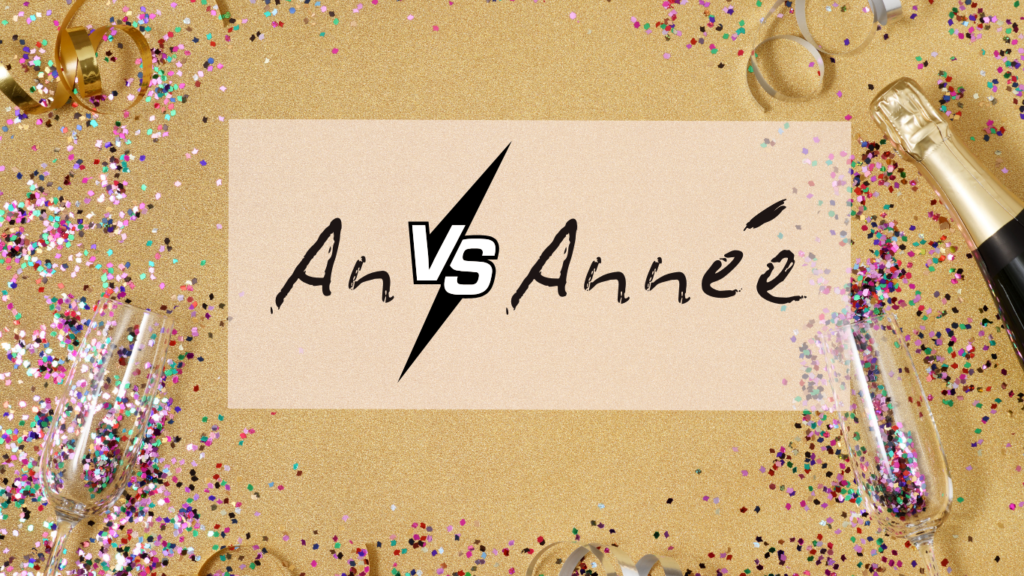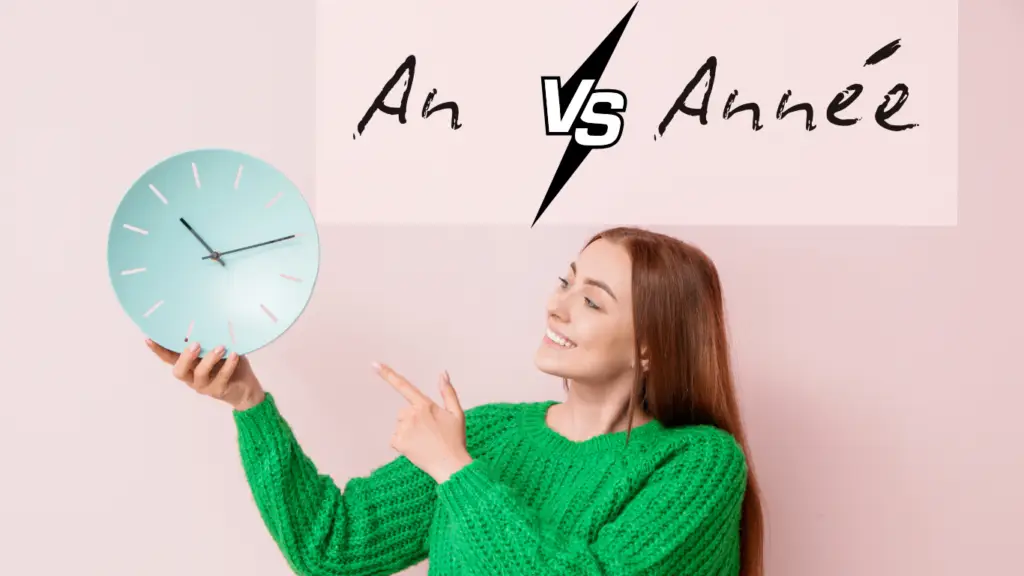If you’ve been learning French for a while, you’ve probably used both “an“ and “année“ to say “year.” But have you ever wondered why French has two words for the same concept? If you’ve been mixing them up, you’re not alone — even advanced learners get tripped up by this subtle distinction.
Understanding the difference between “an” and “année” is key to sounding more natural and fluent in French. The good news? Once you master the pattern, it becomes second nature. Let’s unravel the mystery and finally get this right — with plenty of real-life examples that will help you feel confident the next time you talk about years in French.
An vs Année – What’s the Difference?
At first glance, “an” and “année” both mean “year.” But French speakers use them differently depending on the context and the nuance they want to express.
The key difference:
- “An” = A simple, measurable unit of time
- “Année” = A duration or a period of time
Let’s break that down with some clear examples:
➡️ “An” is used when you’re referring to a countable year — when you’re counting how many years or talking about someone’s age:
- J’ai 30 ans. → I am 30 years old.
- Nous sommes restés en France pendant deux ans. → We stayed in France for two years.
- En quelle année êtes-vous né ? → What year were you born in? (Specific point in time)
➡️ “Année” is used when talking about the experience or the course of a year:
- Cette année a été difficile. → This year has been difficult.
- L’année scolaire commence en septembre. → The school year starts in September.
- Bonne année ! → Happy New Year! (You’re referring to the whole experience of the upcoming year.)
Why It Matters for Expats in France

If you’re an expat living in France, you’ll quickly notice that French people naturally switch between “an” and “année” in conversation depending on the context. This subtle difference can make a big difference in how natural you sound.
Imagine you’ve just moved to Nice and someone asks how long you’ve been in France:
- ❌ “Je suis en France depuis deux années.” → Sounds unnatural
- ✅ “Je suis en France depuis deux ans.” → Sounds fluent and natural
But if you’re talking about the experience of being in France, you’d use “année.” For example:
- ✅ “Cette année en France a été incroyable.” → This year in France has been incredible.
When French people hear you switch between “an” and “année” correctly, it’s a sign that you’ve mastered a tricky part of the language — and that makes a big impression!
How to Say Year in French – Typical Phrases for Expats in France
Here’s where it gets practical. These are real-life phrases you’re likely to use as an expat in France. I’ve organized them by context to make them easy to remember:
Using “An” – Counting and Age
| French Phrase | English Translation |
|---|---|
| J’ai 52 ans. | I’m 52 years old. |
| Il a vécu en France pendant trois ans. | He lived in France for three years. |
| Cela fait cinq ans que nous sommes ici. | We’ve been here for five years. |
| Elle a déménagé à Nice il y a deux ans. | She moved to Nice two years ago. |
| J’ai pris ma retraite il y a dix ans. | I retired ten years ago. |
| J’ai fêté mes 40 ans à Cannes. | I celebrated my 40th birthday in Cannes. |
| Je suis en France depuis trois ans. | I’ve been in France for three years. |
| Il est parti il y a deux ans. | He left two years ago. |
| En quelle année êtes-vous arrivé en France ? | What year did you arrive in France? |
| J’ai passé quatre ans à apprendre le français. | I spent four years learning French. |
Using “Année” – Duration and Experience
| French Phrase | English Translation |
|---|---|
| Cette année a été incroyable. | This year has been incredible. |
| Bonne année ! | Happy New Year! |
| L’année dernière, nous avons voyagé en Italie. | Last year, we traveled to Italy. |
| J’espère que l’année prochaine sera meilleure. | I hope next year will be better. |
| L’année scolaire commence en septembre. | The school year starts in September. |
| L’année de notre mariage a été magique. | The year we got married was magical. |
| Cette année en France a changé ma vie. | This year in France changed my life. |
| Je vais passer l’année prochaine à Paris. | I’m going to spend next year in Paris. |
| L’année a été riche en émotions. | The year has been full of emotions. |
| Il a passé une année à voyager en Europe. | He spent a year traveling in Europe. |
When in Doubt With An or Année…
A good rule of thumb:
➡️ Use “an” when you’re counting or talking about someone’s age.
➡️ Use “année” when you’re talking about the experience of a year.
Think of it this way:
- An = Snapshot → A measurable unit
- Année = Story → The experience or the content of the year
Similar Traps: Soir vs Soirée, Matin vs Matinée, Jour vs Journée
Just when you think you’ve got it figured out… French throws you another curveball! The pattern with “an” vs “année” applies to other time-related words too:
➡️ Soir (evening) vs soirée (the experience of the evening):
- Je suis rentré tard hier soir. → I came home late last night.
- La soirée était géniale ! → The evening was great!
➡️ Matin (morning) vs matinée (the duration of the morning):
- Il fait beau ce matin. → It’s nice this morning.
- J’ai passé la matinée à lire. → I spent the morning reading.
➡️ Jour (day) vs journée (the experience of the day):
- Je travaille cinq jours par semaine. → I work five days a week.
- Quelle belle journée ! → What a beautiful day!
See the pattern? When you’re talking about a countable unit of time, you use the simpler form. When you’re talking about the experience or the duration of the time, you use the longer form.
Fill the Blank And Test Yourself!
Let’s put your new knowledge into practice with this quick exercise. Fill in the blanks with either “an” or “année.”
- J’ai vécu en France pendant trois _____.
- Cette _____ a été très difficile pour nous.
- Il a fêté ses 40 _____ hier.
- L’_____ dernière, nous avons voyagé en Italie.
- Cela fait cinq _____ que nous sommes en France.
- Bonne _____ !
- J’ai commencé mon nouveau travail il y a deux _____.
- Le début de l’_____ scolaire est toujours stressant.
- Elle a passé trois _____ à travailler sur ce projet.
- L’_____ a été riche en émotions.
👉 Want more help mastering French prepositions and time expressions? Check out my article on à, en, au, and aux for more insider tips!
Quiz Yourself on Wordwall: An or Année?
Sign Up for the Feel Good French Newsletter
Final Tip on French Grammar
Mastering “an” vs “année” (and their tricky cousins like soir/soirée and jour/journée) will help you sound more fluent and natural in French. With practice, this will become second nature — and you’ll stop second-guessing yourself every time you talk about time in French.
You’ve got this! 👏
Déborah, Your French Teacher
Go to the Bank in France: The American Expat’s Guide to French Banking
Moving to France as an American means discovering new food, new culture, and—yes—new bureaucracy. One…
French Clothing Sizes in US: A Clear Guide for American Expats
Your first weeks in France are a string of small delights and quick puzzles. The…
How to Practice Speaking French in Nice (Beginner Friendly)
You finally made it. You moved to Nice, one of the most beautiful cities on…
Why “-ent” Is Silent in French Verbs (and Why That Matters)
If you’re an expat learning French, you’ve probably seen verbs ending in -ent and wondered…
Bonjour Bonsoir Meaning in French: Greeting Rules You Must Know
When you’re learning French, one of the first things you’ll come across is the importance…
How to Shop at a French Market (Without Looking Like an Expat)
“C’est combien les asperges, monsieur ?” You ask, slightly unsure, the scent of ripe fraises…







